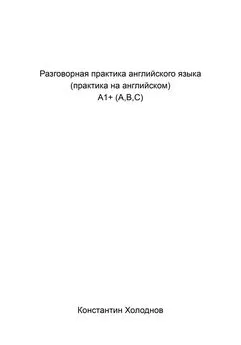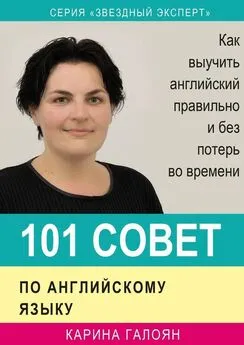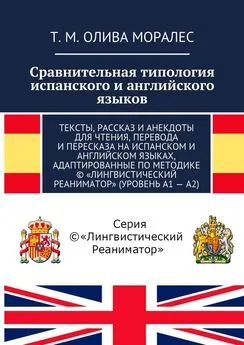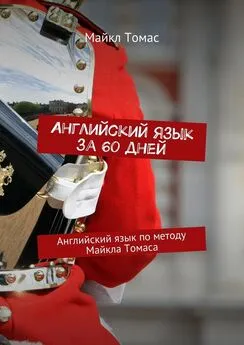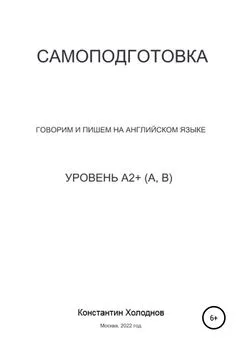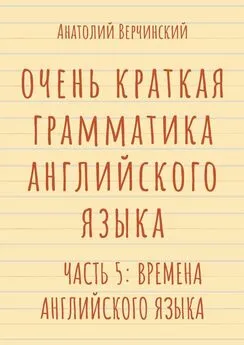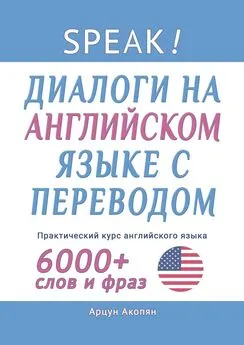Константин Холоднов - Разговорная практика английского языка. Практика на английском. A1+ (A,B,C)
- Название:Разговорная практика английского языка. Практика на английском. A1+ (A,B,C)
- Автор:
- Жанр:
- Издательство:неизвестно
- Год:2022
- ISBN:нет данных
- Рейтинг:
- Избранное:Добавить в избранное
-
Отзывы:
-
Ваша оценка:
Константин Холоднов - Разговорная практика английского языка. Практика на английском. A1+ (A,B,C) краткое содержание
Разговорная практика английского языка. Практика на английском. A1+ (A,B,C) - читать онлайн бесплатно ознакомительный отрывок
Интервал:
Закладка:
*to some extent; fairly
*very
That looks /lʊks/ pretty /ˈprɪti/ amazing, doesn't /ˈdʌznt/ it?
Попробуйте придумать фразу со словом amazing . Я вот такую придумал: My mind /maɪnd/ is amazing.
and conjunction /ənd/, /ən/, /n/, strong form /ænd/ и; затем
used to connect words or parts of sentences
• A1 also; in addition to
хлеб и масло
bread /bred/ and butter /ˈbʌtə(r)/ (а)
(Я, Г: Делайте это медленно и осторожно.)
Do it slowly /ˈsloʊli/ and carefully /ˈkeəfəli/ (а,о).
Может он читать и писать?
Can he read /riːd/ and write /raɪt/?
Примечание oxfordlearnersdictionaries.com:
When and is used in common phrases connecting two things or people that are closely linked, the determiner is not usually repeated before the second: a knife and fork • my father and mother , but a knife and a spoon • my father and my uncle.
• A1 then; following this
(Я, Г: Она вошла и сняла пальто.)
Она пришла в (вошла) и взяла её пальто долой/прочь.
She came /keɪm/ in and took her coat /koʊt/ off /ɒf/.
take /teɪk/ – took /tʊk/ – taken /ˈteɪkən/ (э)
• A1 go, come, try, stay, etc. andused before a verb instead of to, to show purpose
(Г: Я скоро приду и увижу тебя.)
Я буду приходить/приезжать и видеть тебя скоро.
I'll /aɪl/ come /kʌm/ and see /siː/ you soon /suːn/.
Мы остановились и купили некоторого/некоторое_количество/немного/какого-то хлеба.
We stopped /stɒpt/ and bought some /sʌm/ bread /bred/.
buy /baɪ/ – bought /bɔːt/ – bought /bɔːt/
Примечание oxfordlearnersdictionaries.com:
In this structure try can only be used in the infinitive or to tell somebody what to do. Try and finish quickly.
• A1 used to introduce a comment or a question
(Г: – Мы говорили часами. – И что ты решил?)
"Мы говорили в_течение часов." "И что ты решил?"
"We talked /tɔːkt/ for hours /ˈaʊəz/ (э/а/о)." "And what /wɒt/ did you decide /dɪˈsaɪd/?"
• A1 as a result
(Я: Пропусти ещё одно занятие, и ты провалишься.)
(Г: Пропустите ещё один урок, и вы потерпите неудачу.)
Пропусти ещё_один класс и ты будешь терпеть_неудачу.
Miss /mɪs/ another /əˈnʌðə(r)/ (э,а) class /klɑːs/ and you'll /juːl/ fail /feɪl/.
• A1 added to
SYNONYM plus /plʌs/
5 и 5 делают 10.
5 and 5 makes /meɪks/ 10.
Примечание oxfordlearnersdictionaries.com:
When numbers (but not dates) are spoken, andis used between the hundreds and the figures that follow: 2 264 – two thousand, two hundred andsixty-four, but 1964 – nineteen sixty-four.
• A2 used between repeated words to show that something is repeated or continuing
Он пытался и пытался но без успеха.
He tried /traɪd/ and tried but without /wɪˈðaʊt/ success /səkˈses/ (э).
(Я, Г: Боль становилась все сильнее и сильнее.)
Боль получила/достигала_определённого_состояния* хуже и хуже.
* linking verb to reach a particular state or condition; to make somebody/something/yourself reach a particular state or condition
The pain /peɪn/ got /ɡɒt/ worse and worse.
bad /bæd/ – worse /wɜːs/ – worst /wɜːst/ (плохой – хуже (более плохой) – наихудший)
Попробуйте придумать фразу с союзом and . Я вот такую придумал:
I have hot /hɒt/ milk and bread for breakfast /ˈbrekfəst/ (э/а).
angry adjective /ˈæŋɡri/ сердитый, гневный, разгневанный
(comparative angrier/ˈæŋɡrɪə/ (а), superlative angriest/ˈæŋɡriɪst/ (ангриэст))
Примечание oxfordlearnersdictionaries.com:
You can also use more angryand most angry.
• A1
Её поведение реально делало меня сердитым/гневным/разгневанным.
Her behaviour /bɪˈheɪvjə(r)/ (а) really /ˈriːəli/ (э/глотается/а) made me /mi/ angry.
make /meɪk/ – made /meɪd/ – made /meɪd/
Тысячи (кого?) сердитых/гневных/разгневанных демонстраторов заполнили площадь.
Thousands /ˈθaʊzndz/ of angry demonstrators /ˈdemənstreɪtəz/ (э,э) filled /fɪld/ the square /skweə/ (а).
(Я: Пожалуйста, не сердись на меня. Это была не моя вина.)
Пожалуйста не будь сердитым/гневным/разгневанным с мной. Это была не моя вина.
Please /pliːz/ don't /doʊnt/ be angry with /wɪð/ me /mi/. It wasn't /ˈwɒznt/ my fault /fɔːlt/.
(angry with/at somebody)
(Я: Люди очень злы из-за этого решения.)
(Г: Люди очень возмущены этим решением.)
Люди есть очень сердитые/гневные/разгневанные над решением.
The people /ˈpiːpl/ are very /ˈveri/ angry over /ˈoʊvə(r)/ (а) the decision /dɪˈsɪʒn/.
(angry at/about/over something)
Попробуйте придумать фразу со словом angry . Я вот такую придумал:
I am angry with /wɪð/ my neighbor /ˈneɪbə(r)/ (а).
Я, Г: Я злюсь на своего соседа.
animal noun /ˈænɪml/ животное
• A1 a creature that is not a bird, a fish, a reptile, an insect or a human
животные* и птицы (чего?) Южной Америки
*a creature that is not a bird, a fish, a reptile, an insect or a human
the animals /ˈænɪmlz/ and birds /bɜːdz/ of South /saʊθ/ America /əˈmerɪkə/ (а,а)
дикие* животные
*living or growing in natural conditions; not kept in a house or on a farm
wild /waɪld/ animals
(Я: сельскохозяйственные животные)
(Г: домашний скот)
фермерские животные
farm /fɑːm/ animals
• A1 any living thing that is not a plant or a human
(Я: В суде ему запретили содержать животных.)
В суде он был запрещённый от держания/содержания животных*.
*any living thing that is not a plant or a human
In court /kɔːt/ he was /wɒz/ banned /bænd/ from keeping /ˈkiːpɪŋ/ animals.
(be banned from something)
(Я, Г: царство животных)
животное царство/королевство*
*a country that has a king or queen as head of state (= official leader of the country)
*(!!!) one of the three traditional divisions of the natural world
the animal kingdom /ˈkɪŋdəm/ (киндэм/киндом)
• A1 any living creature, including humans
(Я, Г: Люди – единственные животные, у которых развита речь.)
Люди/человеки* есть единственные** животные*** иметь развитую речь.
*a person rather than an animal or a machine
**[only before noun] used to say that no other or others of the same group exist or are there
***any living creature, including humans
Humans /ˈhjuːmənz/ (э) are the only /ˈoʊnli/ animals to have developed /dɪˈveləpt/ (а/о) speech /spiːtʃ/.
Попробуйте придумать фразу со словом animal . Я вот такую придумал: I don't /doʊnt/ have any /ˈeni/ animals /ˈænɪmlz/.
another determiner, pronoun /əˈnʌðə(r)/ (э,а) ещё один; другой
• A1 one more; an extra thing or person
(Г: Вы хотели бы ещё выпить?)
Вы бы желали ещё_один* алкогольный_напиток/жидкость_для_питья**?
*one more; an extra thing or person
**[countable, uncountable] a liquid for drinking; an amount of a liquid that you drink
**[countable, uncountable] alcohol or an alcoholic drink; something that you drink on a social occasion
Would /wʊd/ you like /laɪk/ another drink /drɪŋk/?
"Это есть счёт*." "Оу нет, не ещё_один!"
*(!!!) a document that shows how much you owe somebody for goods or services
*(especially British English)(North American English usually check) a piece of paper that shows how much you have to pay for the food and drinks that you have had in a restaurant
"It's /ɪts/ a bill /bɪl/." "Oh /oʊ/ no /noʊ/, not /nɒt/ another!"
(Я: Вчера мне позвонили ещё раз.)
(Г: Вчера я получил ещё один такой звонок.)
Я получил ещё_один из тех звонков вчера.
I got another of those /ðoʊz/ calls /kɔːlz/ yesterday /ˈjestədeɪ/ (у).
get /ɡet/ – got /ɡɒt/ – got /ɡɒt/
• A1 different; a different person or thing
(Г: Давайте сделаем это в другой раз.)
Давайте делать это другое* время.
*different; a different person or thing
Let's /lets/ do it another time /taɪm/.
Я не люблю (мне не нравится) эта комната. Я есть идущий (я собираюсь) спрашивать/просить/спросить для другой (просить/требовать другую).
I don't /doʊnt/ like /laɪk/ this room /ruːm/, /rʊm/. I'm /aɪm/ going /ˈɡoʊɪŋ/ to ask /ɑːsk/ for another.
(ask for something)
Попробуйте придумать фразу со словом another . Я вот такую придумал:
Would /wʊd/ you like /laɪk/ another pot /pɒt/ of tea /tiː/?
answer noun /ˈɑːnsə(r)/ (а) ответ; решение проблемы
• A1 something that you say, write or do to react to a question or situation
(Я, Г: Короткий ответ: нет.)
Короткий ответ* есть нет.
*something that you say, write or do to react to a question or situation
The short /ʃɔːt/ answer is no /noʊ/.
Простой* ответ есть что мы не знаем.
*not complicated; easy to understand or do
*SYNONYM easy /ˈiːzi/
*basic or plain without anything extra or unnecessary
*used before a noun to emphasize that it is exactly that and nothing else
*[usually before noun] consisting of only a few parts; not complicated in structure
Читать дальшеИнтервал:
Закладка:
